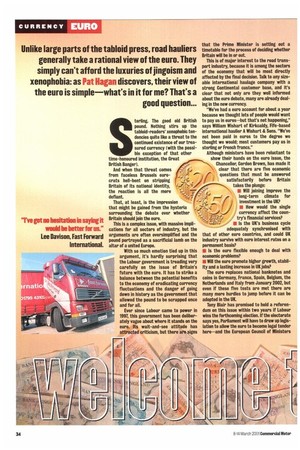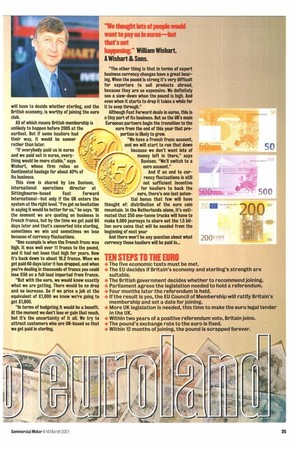Unlike large parts of the tabloid press, road hauliers generally
Page 36

Page 37

If you've noticed an error in this article please click here to report it so we can fix it.
take a rational view of the euro. They simply can't afford the luxuries of jingoism and xenophobia: as Pat Hagan discovers, their view of the euro is simple what's in it for me? That's a good question...
Sterling. The good old British pound. Nothing stirs up the tabloid-readers' xenophobic tendencies quite like a threat to the continued existence of our treasured currency (with the possible exception of that other time-honoured institution, the Great British Banger).
And when that threat comes from faceless Brussels eurocrats hell-bent on stripping
jlrt"
Britain of its national identity, the reaction is all the more
defiant. ph? 7 That, at least, is the impression
that might be gained from the hysteria surrounding the debate over whether Britain should join the euro.
This is a complex issue, with massive implications for all sectors of industry, but the arguments are often oversimplified and the pound portrayed as a sacrificial lamb on the altar of a united Europe.
With so much emotion tied up in this argument, it's hardly surprising that the Labour government is treading very carefully on the issue of Britain's future with the euro. It has to strike a balance between the potential benefits to the economy of eradicating currency fluctuations and the danger of going down in history as the government that allowed the pound to be scrapped once and for all.
Ever since Labour came to power in 1997, this government has been deliberately vague about where it stands on the euro. Its wait-and-see attitude has attracted criticism, but there are signs that the Prime Minister is setting out a timetable for the process of deciding whether Britain will be in or out.
This is of major interest to the road transport industry, because it is among the sectors of the economy that will be most directly affected by the final decision. Talk to any sizeable international haulage company with a strong Continental customer base, and it's clear that not only are they well informed about the euro debate, many are already dealing in the new currency.
"We've had a euro account for about a year because we thought lots of people would want to pay us in euros—but that's not happening," says William Wishart of Kirkcaldy, Fife-based international haulier A Wishart & Sons. "We've not been paid in cures to the degree we thought we would; most customers pay us in sterling or French francs."
Although ministers have been reluctant to show their hands on the euro issue, the Chancellor, Gordon Brown, has made it clear that there are five economic questions that must be answered satisfactorily before Britain takes the plunge: Will joining improve the long-term climate for investment in the UK?
0 How would the single I I, Zak¤cy affect the country's financial services? • 11ragr a Is the UK's business cycle
adequately synchronised with that of other euro countries, and could UK industry survive with euro interest rates on a permanent basis?
Is the euro flexible enough to deal with economic problems?
_ Will the euro promote higher growth, stability and a lasting increase in UK jobs?
The euro replaces national banknotes and coins in Germany, France, Spain, Belgium, the Netherlands and Italy from January 2002, but even if these five tests are met there are many more hurdles to jump before it can be adopted in the UK, Tony Blair has promised to hold a referen dum on this issue within two years if Labour wins the forthcoming election. If the electorate says yes, Parliament will have to draw up legislation to allow the euro to become legal tender here—and the European Council of Ministers will have to decide whether sterling, and the British economy, is worthy of joining the euro club.
All of which means British membership is unlikely to happen before 2005 at the earliest, But if some hauliers had their way, it would be sooner rather than later.
"If everybody paid us in euros and we paid out in euros, everyl'errir• thing would be more stable," says Wishart, whose firm relies on Continental haulage for about 40% of Its business.
This view is shared by Lee Davison, 1;1111 international operations director at Sittingbourne-based Fast Forward International—but only if the UK enters the system at the right level, "I've got no hesitation in saying it would be better for us," he says. "At the moment we are quoting on business in French francs, but by the time we get paid 60 days later and that's converted into sterling, sometimes we win and sometimes we lose because of currency fluctuations.
"One example is when the French franc was high. It was well over 11 francs to the pound, and it had not been that high for years. Now it's back down to about 10.2 francs. When we get paid 60 days later it has dropped, and when you're dealing in thousands of francs you could lose £50 on a full load imported from France.
"But with the euro, we would know exactly what we are getting. There would be no drop and no increase. So if we price a job at the equivalent of £1,000 we know we're going to get £1,000.
"In terms of budgeting it would be a benefit. At the moment we don't lose or gain that much, but it's the uncertainty of it all. We try to attract customers who are UK-based so that we get paid in sterling. "The other thing is that in terms of export business currency changes have a great bearing. When the pound is strong it's very difficult for exporters to sell products abroad, because they are so expensive. We definitely see a slow-down when the pound is high. And even when it starts to drop it takes a while for it to seep through."
Although Fast Forward deals in euros, this is a tiny part of its business. But as the UK's main European partners begin the transition to the euro from the end of this year that proportion is likely to grow.
"We have a French franc account,
and we will start to run that down because we don't want lots of . money left in there," says Davison. "We'll switch to a
euro account."
And if an end to currency fluctuations is still ,/ not sufficient incentive for hauliers to back the euro, there's one last potential bonus that few will have thought of distribution of the euro coin mountain. In the Netherlands alone, it's estimated that 250 one-tonne trucks will have to make 8,000 journeys to share out the 1.5 billion euro coins that will be needed from the beginning of next year
And there won't be any question about what currency those hauliers will be paid in... czNif
































































































